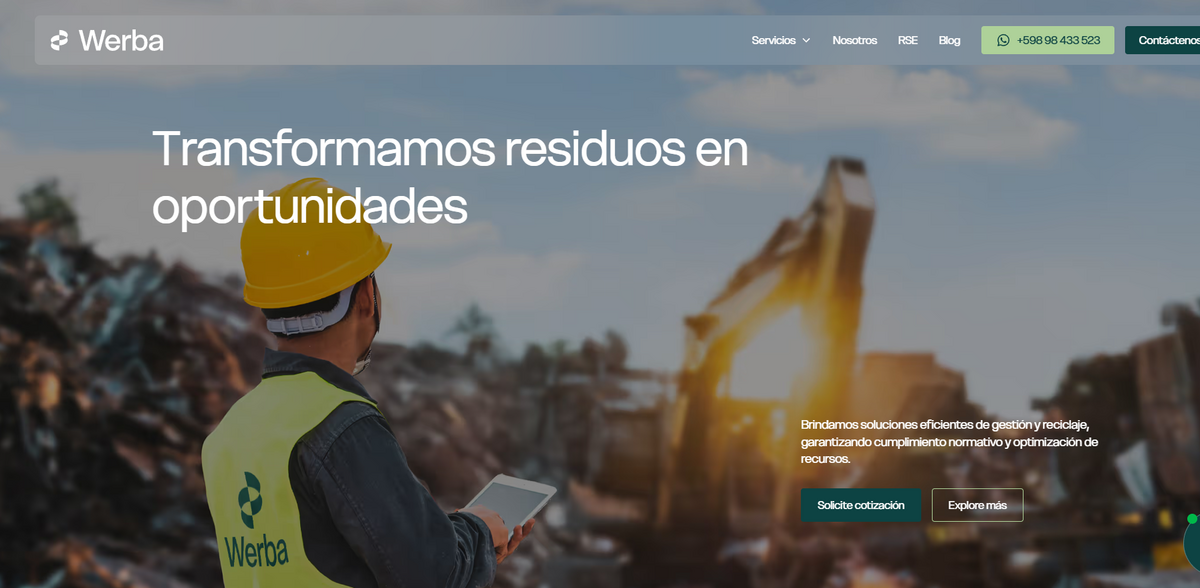What is the Werba Project?
The Werba project is an innovative initiative that focuses on transparent and efficient management of ferrous and non-ferrous metals alongside a comprehensive waste management strategy. At its core, the project acquires and markets metals with competitive prices, ensuring complete transparency in every transaction. It also extends into electronic device recycling by managing Waste Electrical and Electronic Equipment (WEEE) to ensure that recyclable materials are recovered and any hazardous components are disposed of properly. From lead-acid battery recycling to the safe handling of waste transportation and disposal, every facet is designed to optimize operations and meet environmental regulations. Additionally, non-destructive metal analysis is available to help determine the composition and quality of metals—a service that enables clients to maximize the value of their recyclable materials. The project even offers certified material destruction for obsolete or confidential assets, new and used iron yards, and specialized handling for industrial waste and lithium battery recycling. All of these services work together to create a holistic, eco-friendly, and cost-effective approach to waste management.
Key Benefits of Efficient Waste Management
The project brings measurable benefits from both an economic and an environmental perspective. Key figures and facts include:
- 95.6% Recycling Rate: In 2024, 11,038,375 kg of waste was processed while only 457,410 kg was sent to final disposal compared to mining extraction.
- 10% Energy Cost for Aluminum: Recycling aluminum or copper costs only 10% of the energy used in mining extraction.
- 30% Energy Cost for Stainless Steel: Recycling steel represents just 30% of the energy cost compared to mining extraction.
- 665,475 Liters of Water Savings: Metal recycling in 2024 saved approximately 665,475 liters of water relative to mining extraction.
- 102.38 MW Energy Savings: The metal recycling process in 2024 achieved an energy saving of 102.38 MW.
- 1,365,438 Liters of Oil Savings: During the recycling of WEEE in 2024, there was a savings of 1,365,438 liters of oil relative to mining extraction.
These numbers not only highlight the practicality of the project but also underline its environmental relevance.
Diverse Services Offered
The range of services under the Werba project is as varied as it is impactful. Vital services include metal marketing, where ferrous and non-ferrous metals are acquired and marketed with utmost transparency and competitive pricing. Electronic device recycling is handled with great care to recover all viable materials from WEEE while ensuring that components which cannot be reused are properly disposed. Alongside these, lead battery recycling provides a responsible solution that averts the release of toxic substances, promoting a circular disposition of materials. Whether it is waste management and transportation or certified material destruction, every service is designed to guarantee responsible handling of resources. Additionally, the project caters to customers with a new and used iron yard in Libertad, provides customized solutions for industrial waste management, and safely manages the recycling of lithium batteries. It is a full-spectrum service committed to industry excellence.
Commitment to Sustainability
At the heart of the project lies an unwavering commitment to sustainability. Cost optimization, regulatory compliance, and environmental benefits merge to create robust sustainable practices throughout each process. The initiatives are designed not only to reduce the energy and water footprint compared to traditional mining extraction methods but also to drive forward a positive environmental narrative. The approach is conversational and dynamic—each element, whether marketing metals or recycling electronic components, takes a responsible stance towards preserving the planet for future generations… Efficiency and sustainability go hand in hand.
Focus on Safety and Compliance
Safety, compliance, and transparency are non-negotiable aspects of the Werba project. Each step, from metal analysis to the certified destruction of obsolete materials, is subject to rigorous oversight. All procedures ensure adherence to environmental regulations and traceability of the materials handled. This meticulous focus on safety not only protects the environment but also builds reliable confidence among customers, making the project a benchmark in both operational excellence and environmental stewardship.
Project Impact on Sustainable Development
- SDG 6: Clean Water and Sanitation – With significant water savings during metal recycling processes.
- SDG 7: Affordable and Clean Energy – As energy savings in metal and electronic waste recycling are remarkable.
- SDG 9: Industry, Innovation, and Infrastructure – Evidenced by advanced and non-destructive metal analysis and effective resource management.
- SDG 12: Responsible Consumption and Production – Through certified material destruction and an emphasis on proper recycling practices.
- SDG 13: Climate Action – By reducing energy consumption as compared to mining extraction and lowering the overall carbon footprint.
Engaging with a Greener Tomorrow
The Werba project offers a forward-thinking approach that resonates with current environmental and economic imperatives. Similar to an open conversation about progress and responsibility, it invites stakeholders to reimagine waste management—not just as a regulatory necessity but as a catalyst for sustainable innovation. Cost optimization, along with the significant environmental benefits such as energy and water savings, creates an ecosystem where efficiency and environmental integrity meet. This dynamic blend of transparency, advanced technology, and eco-conscious practices reflects a genuine commitment to a greener tomorrow. In a world where every kilogram of recycled metal and each liter of water saved counts, the project stands as a comprehensive example of how responsible waste management can make a lasting difference.






















